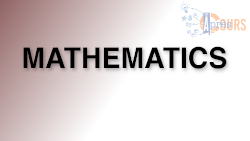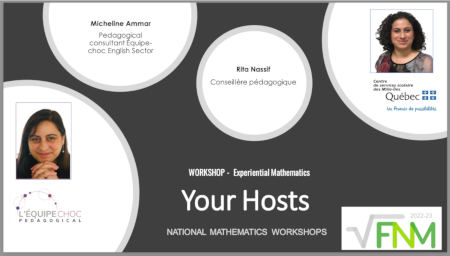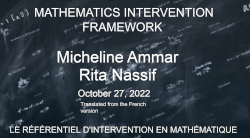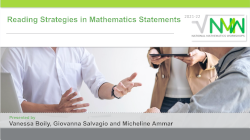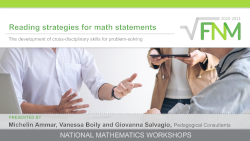Collective Marking Training Session, part 2: Examination and Breakdown of Rubrics.
Collective Marking Training Session, Part One: The Mathematics Programs and Definition of the Evaluation Domain (D.E.D.)
Experiential learning is learning through experience and it gained significance as the learners are asked to reflect on their experience. Hands-on activities are promoted in experiential learning. Learners become more dynamic in experiential learning than the traditional didactic classroom, the trademark of passive learning. During this webinar, the participants experienced activities to discover this concept which was subsequently supported by theory. A resource bank was shared to provide teachers with material they could use in class.
During this meeting, the participants are surveyed on the project undertaken in the Francophone sector to review the programs and evaluations in mathematics.
« The Mathematics Intervention Framework is based on research evidence. It is based on the same principles as those of the previous benchmarks. Its objective is to support the development of students’ mathematical skills, particularly those experiencing difficulties in this discipline or at risk of doing so. It provides guidelines for school teams, enabling them to reflect on their practice, clarify their actions, and, in this way, to better meet the needs of students in mathematics. The Référentiel d’intervention en mathématique provides guidance to teachers on how to approach mathematical concepts. It also defines the intentions of problem-solving and specifies the role of the teacher and the student in the mathematics classroom. » MEQ This webinar was on October 27, 2022. It was hosted by Micheline Ammar, Equipe-Choc pedagogical and Rita Nassif, conseillère pédagogique, CSSMÎ. Summary By clicking on the hyperlink of one of the points in the table below, you will be redirected to the precise moment of the recording when this point was discussed. Documents and links The presentation used during the workshop Le référentiel d’intervention en mathématique Math Curriculum Makeover: Dan Meyer – His videos – His blog The site of the National mathematics workshops
First Mathematics Community Après-cours of the year. A round table of experts has been organized to share and discuss their experiences teaching the CCBE program. They provide advice for teachers, their successes and challenges.
Second Mathematics Community Après-cours of the year. This Apres-cours is intended for all levels of Mathematics. We review modification to the FBD Mathematics Program and preview a CCBE project.
In this workshop, we will present some learning activities that can help students consolidate reading strategies.
By the end of the workshop you will: You should be able – To have a better understanding of reading strategies and how it applies to mathematics; – To be aware of some digital resources/tools to support students reading. Presented by: Vanessa Boily and Micheline Ammar Collaborator: Giovanna Salvagio Summary By clicking on the hyperlink of one of the points in the table below, you will be redirected to the precise moment of the recording when this point was discussed. Documents and links The presentation used during the workshop Math & reading: inclusive strategies Series on workshops on « curiosity » in math Quatre profils de lecteurs bien distincts (vidéos) Accessibility Resources to Support Reading Strategies The site of the National mathematics workshops
First Mathematics Community Après-cours of the year. This Apres-cours is intended for all levels of Mathematics.
Welcome to the Community
